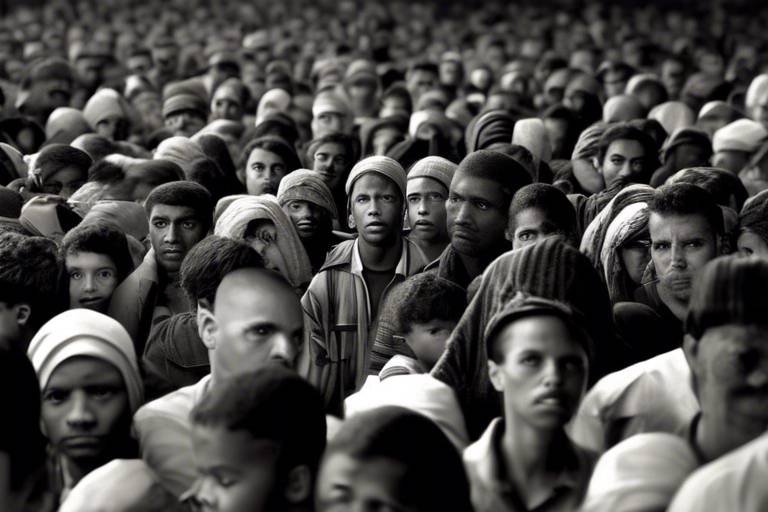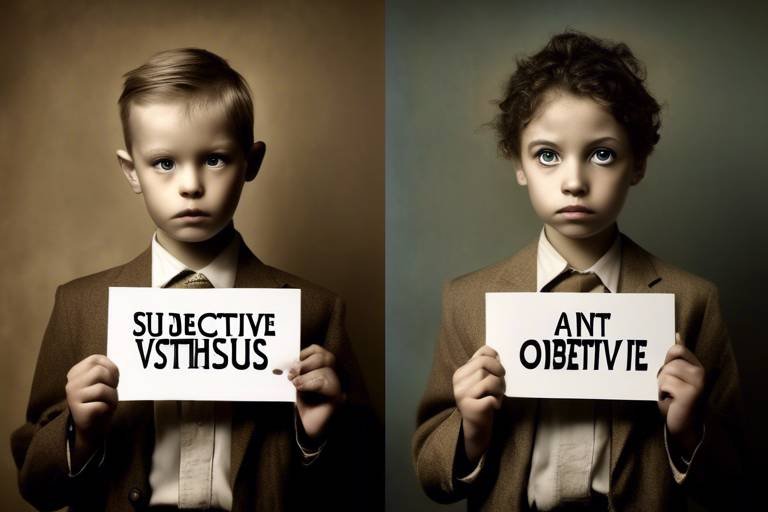Ethical Dilemmas in Immigration - A Closer Examination
The topic of immigration is often riddled with ethical dilemmas that challenge our values and beliefs as a society. As we navigate through discussions about immigration, we encounter a myriad of perspectives that tug at our sense of morality and justice. On one hand, there are national interests that demand attention—security, economic stability, and cultural integrity. On the other hand, we face the humanitarian responsibility to protect those seeking refuge from oppression, violence, and poverty. This constant balancing act raises critical questions: Should we prioritize our national interests over the plight of individuals? How do we ensure that our policies reflect both compassion and pragmatism?
At the heart of these discussions lies a fundamental tension between human rights and national sovereignty. Are countries obligated to open their borders to those in need, or do they have the right to control who enters their territory? This dilemma is particularly pronounced in the context of refugees and economic migrants, where the ethical implications of our choices become even more complex. As we delve deeper into this subject, we will explore the various dimensions of immigration ethics, including the rights of asylum seekers, the economic contributions of immigrants, and the broader impact on host communities.
As we peel back the layers of this intricate issue, it becomes evident that immigration is not just a political or economic concern; it is a deeply human issue that speaks to our collective conscience. The decisions we make about immigration policy can either uphold our shared values of dignity and respect or undermine them, leading to a society that is fragmented and fearful. In this examination, we will strive to illuminate the ethical considerations that must inform our approach to immigration, ensuring that we do not lose sight of the humanity at stake.
To truly grasp the ethical dilemmas surrounding immigration, it’s essential to understand the foundational principles that guide these discussions. The ethics of immigration often revolve around key themes such as justice, equality, and compassion. These principles compel us to consider not only the legal aspects of immigration but also the moral implications of our policies and actions. For instance, how do we reconcile the need for border security with the obligation to protect vulnerable populations? This question lies at the core of many immigration debates.
Moreover, the ethical landscape is further complicated by the diverse motivations behind migration. While some individuals seek asylum from persecution, others migrate for economic opportunities. This distinction raises important ethical questions about how we prioritize different groups within our immigration policies. Are we prepared to treat all migrants with the same level of dignity and respect, regardless of their circumstances? Or do we allow biases and misconceptions to influence our decisions?
The intersection of human rights and immigration is a vital area of exploration. Countries have a moral obligation to uphold the rights of migrants and refugees, ensuring their access to safety, shelter, and basic necessities. The Universal Declaration of Human Rights states that everyone has the right to seek asylum from persecution, a principle that underscores the ethical responsibility of nations to protect those fleeing danger. Yet, as we witness increasing restrictions on asylum seekers, the ethical implications of these policies come into sharp focus.
When discussing immigration, it’s crucial to differentiate between refugees and economic migrants. Refugees are often fleeing life-threatening situations, while economic migrants seek better opportunities for themselves and their families. This distinction can lead to ethical dilemmas in immigration policy, particularly when resources are limited. Should we prioritize refugees who are in immediate danger over those who are simply seeking a better life? This question challenges our ethical frameworks and compels us to consider the broader implications of our choices.
The right to seek asylum is a fundamental human right, yet it is often met with resistance and skepticism. Nations have a responsibility to protect individuals fleeing persecution, but the ethical implications of denying asylum can be profound. When we turn away those in desperate need, we not only violate their rights but also compromise our own moral integrity as a society. It is essential to recognize that the right to asylum is not just a legal obligation; it is a reflection of our shared humanity.
Contrary to common misconceptions, immigrants are not a burden on society; rather, they play a vital role in driving economic growth. Studies have shown that immigrants contribute significantly to the labor force, fill essential jobs, and stimulate local economies. By embracing immigrants and recognizing their contributions, we can foster a more inclusive and prosperous society. The ethical consideration here is clear: we must challenge the narrative that portrays immigrants as liabilities and instead celebrate their positive impact on our communities.
Border control and security present another layer of ethical dilemmas in immigration discussions. While it is essential to protect national interests, we must also consider the rights and dignity of individuals attempting to cross borders. The challenge lies in finding a balance that ensures safety without compromising our ethical obligations to treat all individuals with respect. This balancing act can be incredibly complex, as fear and misinformation often cloud our judgment and lead to policies that harm rather than help.
Immigration significantly impacts local communities, both positively and negatively. On one hand, immigrants can bring diverse perspectives, enrich cultural landscapes, and contribute to economic vitality. On the other hand, rapid demographic changes can lead to tensions and challenges in social cohesion. The ethical implications of these impacts must be carefully considered, as we strive to create communities that embrace diversity while maintaining a sense of belonging for all.
Striking a balance between social cohesion and diversity is a key ethical consideration in immigration policy. While it is important to foster inclusive communities that celebrate differences, we must also ensure that these differences do not lead to division. The challenge lies in promoting dialogue and understanding, allowing individuals from various backgrounds to coexist harmoniously. This requires a commitment to education, empathy, and active engagement in building bridges between communities.
The ethical ramifications of different immigration policies cannot be overlooked. Approaches such as open borders, strict regulations, and pathways to citizenship each carry their own set of ethical considerations. As we analyze these policy responses, it is crucial to ask ourselves: What values do we want our immigration system to reflect? How can we create policies that uphold human rights while addressing legitimate national concerns? These questions are not just theoretical; they have real-world implications for millions of individuals seeking a better life.
- What are the main ethical dilemmas in immigration? Ethical dilemmas in immigration often revolve around balancing national interests with humanitarian responsibilities, the rights of asylum seekers, and the economic contributions of immigrants.
- How do human rights relate to immigration? Human rights are central to immigration discussions, as countries have a moral obligation to protect the rights of migrants and refugees seeking safety and opportunity.
- What is the difference between refugees and economic migrants? Refugees flee life-threatening situations, while economic migrants seek better opportunities. This distinction raises ethical questions about how to prioritize different groups in immigration policy.
- What is the right to asylum? The right to asylum is a fundamental human right that allows individuals to seek protection from persecution, and nations have a responsibility to uphold this right.
- How do immigrants contribute to the economy? Immigrants contribute to the economy by filling essential jobs, driving innovation, and stimulating local growth, challenging the notion that they are a burden on society.
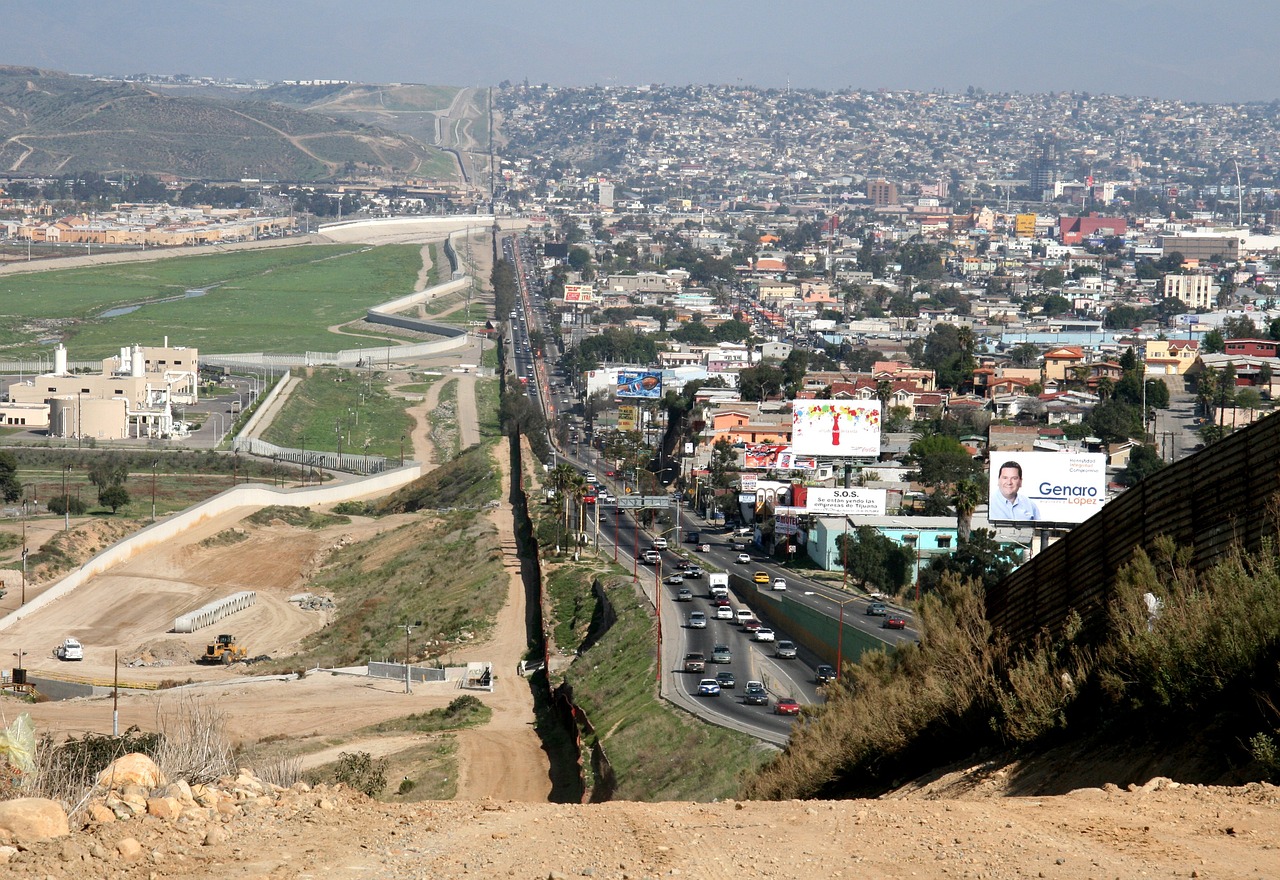
Understanding Immigration Ethics
When we dive into the murky waters of immigration ethics, we find ourselves navigating a complex web of principles and responsibilities. At its core, immigration ethics revolves around the delicate balance between national interests and our humanitarian responsibilities. On one hand, nations have a duty to protect their borders and maintain social order; on the other, they are morally obligated to extend a helping hand to those in dire need. This creates a fascinating, yet challenging, ethical landscape.
At the heart of this discussion lies the question: what ethical frameworks should guide our immigration policies? Many argue that a utilitarian approach, which focuses on the greatest good for the greatest number, can help shape fair immigration practices. However, this perspective often clashes with deontological ethics, which asserts that certain rights and duties must be upheld, regardless of the consequences. For instance, should we prioritize the needs of our citizens over the rights of migrants? Or does our moral obligation to help those in need outweigh national interests?
In addition to these philosophical debates, we must also consider the implications of immigration on societal values. Countries that embrace diversity and inclusivity often find themselves enriched by the cultural contributions of immigrants. Yet, the fear of losing a national identity can lead to resistance against immigration policies. It's akin to a potluck dinner: if everyone brings their unique dish, the table becomes a feast of flavors; however, if one person insists on serving only their favorite dish, the experience can become dull and exclusionary.
Moreover, ethical immigration discussions often bring to light the human rights of migrants. Every individual, regardless of their nationality, possesses inherent rights that should be respected and protected. This raises critical questions about how we treat those who cross borders in search of safety and opportunity. Are we, as a society, willing to uphold the dignity of every person, or do we allow fear and prejudice to dictate our policies?
To further illustrate these points, consider the following table that summarizes key ethical principles related to immigration:
| Ethical Principle | Description |
|---|---|
| Human Dignity | Every individual deserves respect and the right to live free from persecution. |
| Justice | Fair treatment for all individuals, regardless of their immigration status. |
| Solidarity | Support for those seeking refuge and a better life. |
| Responsibility | Nations must take responsibility for their immigration policies and their impacts. |
Ultimately, understanding immigration ethics requires a multifaceted approach that considers the diverse perspectives and experiences of all involved. As we continue to engage in this critical conversation, we must remain open to the complexities of human experience and the moral imperatives that guide our actions. After all, immigration is not just a political issue; it is a deeply personal one that affects lives, families, and communities.

Human Rights and Immigration
When we talk about human rights in the context of immigration, we're diving into a pool of complex moral obligations and ethical responsibilities. It's not just about laws and regulations; it's about the very essence of what it means to be human. Every day, individuals and families make the harrowing decision to leave their homes, often fleeing violence, persecution, or dire economic circumstances. In these moments of desperation, the question arises: what are the responsibilities of nations towards these vulnerable populations?
At the heart of this discussion lies the idea that every person, regardless of their nationality or immigration status, possesses inherent rights. These rights are enshrined in various international treaties and declarations, such as the Universal Declaration of Human Rights. This document asserts that everyone has the right to seek asylum from persecution. However, the reality is often starkly different. Many countries impose stringent immigration policies that can effectively strip individuals of their rights, leaving them in limbo, vulnerable to exploitation and abuse.
Moreover, the distinction between refugees and economic migrants complicates matters further. Refugees are individuals who flee their home countries due to fear of persecution based on race, religion, nationality, political opinion, or membership in a particular social group. They are often granted specific protections under international law. In contrast, economic migrants move primarily for better job opportunities and living conditions. While both groups deserve compassion and support, the ethical considerations for each can differ significantly. For instance, should a nation prioritize refugees over economic migrants, or should the focus be on the needs of all individuals seeking a better life?
The right to seek asylum is a fundamental aspect of human rights in immigration. Countries are obligated to provide refuge to individuals fleeing persecution. This means that when someone arrives at a border seeking safety, the ethical response should be to assess their claims fairly and compassionately. However, many nations have implemented policies that deter asylum seekers, such as physical barriers, lengthy wait times, and complicated legal processes. These measures not only violate the spirit of humanitarianism but also raise serious ethical questions about the treatment of those in desperate need.
It's essential to recognize that immigrants, regardless of their status, contribute significantly to the economies of their host countries. They fill vital roles in various sectors, from agriculture to healthcare, often taking on jobs that locals may overlook. This contribution challenges the stereotype that immigrants are a burden on society. In fact, studies show that immigrants can help stimulate economic growth, create jobs, and even contribute to innovation. Thus, when discussing immigration ethics, it's crucial to consider these positive impacts alongside the humanitarian obligations.
In light of these considerations, it becomes clear that the ethical landscape of immigration is multifaceted. Nations must navigate the delicate balance between protecting their borders and upholding the rights and dignity of individuals. The conversation around immigration should not merely focus on legality but should also encompass the moral imperatives that bind us as a global community.
- What are the basic human rights that immigrants have? Immigrants have the right to seek asylum, access to basic healthcare, education, and protection from discrimination, regardless of their legal status.
- How do countries determine who qualifies as a refugee? Countries typically assess asylum claims based on the individual's fear of persecution due to race, religion, nationality, political opinion, or membership in a particular social group.
- What is the ethical responsibility of countries towards economic migrants? While economic migrants may not have the same protections as refugees, countries still have an ethical obligation to treat them with dignity and respect, considering their contributions to society.

Refugees vs. Economic Migrants
When we dive into the complex waters of immigration, one of the most pressing ethical dilemmas we encounter is the distinction between refugees and economic migrants. These two groups, while often lumped together in public discourse, face vastly different circumstances and ethical considerations. On one hand, refugees are individuals fleeing from persecution, war, or violence, often arriving in host countries with little more than the clothes on their backs and a desperate hope for safety. On the other hand, economic migrants seek better opportunities for work and a higher quality of life, often driven by the desire to provide for their families and improve their circumstances.
This distinction is not merely academic; it has profound implications for immigration policy and public perception. For instance, refugees are typically granted certain protections under international law, including the right to seek asylum. This legal framework is rooted in the ethical obligation to protect those who are in dire need. Economic migrants, however, often find themselves navigating a more complicated landscape, where their motives may be viewed with skepticism. The challenge lies in balancing the urgent humanitarian needs of refugees against the economic aspirations of migrants.
To illustrate, let’s consider some key differences:
| Aspect | Refugees | Economic Migrants |
|---|---|---|
| Reason for Migration | Fleeing persecution or conflict | Seeking better economic opportunities |
| Legal Protections | Protected under international law | Varies by country and policy |
| Public Perception | Often viewed sympathetically | May face skepticism or resistance |
| Integration Challenges | Trauma and loss | Economic competition and adaptation |
As we examine these differences, it becomes clear that the ethical considerations surrounding each group are layered and multifaceted. For refugees, the immediate need for safety and protection is paramount, raising questions about the responsibilities of host nations. Are countries doing enough to uphold their commitments to protect those in peril? Conversely, economic migrants also deserve attention; they contribute significantly to the economies of their host countries and often fill critical labor shortages. Their inclusion in immigration discussions is essential, as it challenges the narrative that they are merely a burden on society.
In conclusion, the ethical implications of distinguishing between refugees and economic migrants are profound. We must recognize the unique challenges each group faces while advocating for policies that reflect our shared humanity. This balance is not easy, but it is necessary if we are to foster a more inclusive and compassionate world.
- What is the main difference between a refugee and an economic migrant? Refugees flee from danger and persecution, while economic migrants move for better job opportunities.
- Are refugees legally protected? Yes, refugees have specific protections under international law, including the right to seek asylum.
- Do economic migrants contribute to the economy? Absolutely! Economic migrants often fill essential roles and contribute to the growth of local economies.
- Why is it important to distinguish between these two groups? Understanding the differences helps inform fair and humane immigration policies that address the needs of both groups.

The Right to Asylum
The right to seek asylum is a fundamental aspect of international human rights law, rooted in the belief that individuals fleeing persecution should have a safe haven. This ethical principle underscores the moral obligation of nations to provide refuge for those in dire circumstances. Imagine being forced to leave your home, not because you want to, but because your very life is at stake. This is the reality for countless individuals who seek asylum. They are not merely seeking a better life; they are escaping violence, oppression, and persecution.
At the heart of the asylum debate lies a series of ethical dilemmas that challenge the balance between national interests and humanitarian responsibilities. Countries often grapple with the question: How do we protect our borders while honoring our obligations to those in need? The answer is complex and varies significantly from one nation to another. For instance, some countries have adopted inclusive policies that prioritize humanitarian considerations, while others enforce strict regulations that can leave vulnerable populations in limbo.
International law, particularly the 1951 Refugee Convention, establishes that individuals have the right to seek asylum from persecution. This convention outlines the criteria for refugee status and the responsibilities of nations to protect those who qualify. However, despite these legal frameworks, many asylum seekers face significant hurdles. They often encounter bureaucratic red tape, hostility, and even detention, which raises critical ethical questions about the treatment of individuals in their most vulnerable state.
Moreover, the ethical implications extend beyond just the individual seeking asylum. Host countries must consider how their policies affect their own citizens and the social fabric of their communities. For example, when a nation welcomes asylum seekers, it can enrich the local culture and economy, fostering diversity and innovation. On the flip side, if these individuals are met with resistance or discrimination, it can lead to social tension and division.
To illustrate the ethical considerations involved, let's look at a few key responsibilities that nations have towards asylum seekers:
- Protection from Persecution: Nations must ensure that those who arrive at their borders seeking safety are not sent back to face the dangers they fled.
- Fair Processing of Asylum Claims: It is essential that asylum claims are processed fairly and promptly, respecting the rights of individuals throughout the process.
- Integration Support: Providing resources and support for asylum seekers to integrate into society can foster a sense of belonging and community.
The ethical implications of the right to asylum are profound and multifaceted. As we navigate these complex issues, it is crucial for nations to reflect on their values and commitments to human rights. The challenge lies not only in creating policies that uphold the right to seek asylum but also in fostering a culture of empathy and understanding towards those who are often marginalized. Ultimately, the way we treat asylum seekers speaks volumes about our collective humanity.
- What is the process for seeking asylum? Asylum seekers must typically apply for protection at a designated point of entry or within the host country, providing evidence of their persecution.
- Are all asylum seekers granted asylum? No, each claim is assessed on its own merits, and not all applicants meet the criteria for refugee status.
- Can asylum seekers work while their claims are being processed? This varies by country; some allow work permits after a certain period, while others do not.
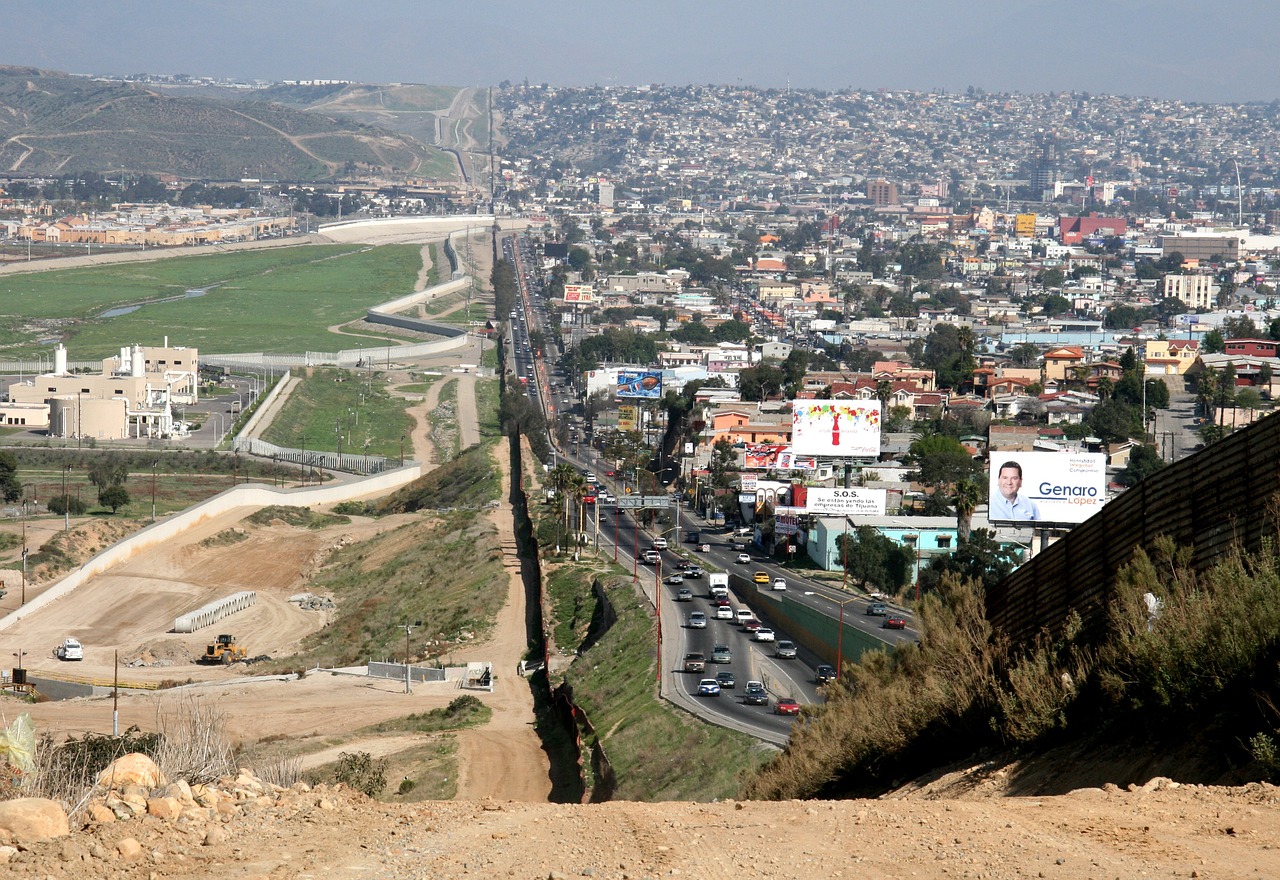
Economic Contributions of Immigrants
The conversation surrounding immigration often gets bogged down in the rhetoric of burden versus benefit. However, when we peel back the layers of this debate, we discover a rich tapestry of economic contributions that immigrants make to their host countries. It's easy to fall into the trap of viewing immigrants as mere recipients of social services, but this perspective overlooks the dynamic roles they play in driving economic growth and innovation.
To illustrate this point, consider the fact that immigrants are responsible for a significant portion of entrepreneurial activity in many nations. In the United States, for example, immigrants have founded more than 40% of Fortune 500 companies. This statistic highlights not only their ambition but also their capacity to create jobs and stimulate local economies. Each new business not only provides employment opportunities but also contributes to the tax base, which in turn funds public services. It's a win-win situation that often goes unrecognized.
Moreover, immigrants fill essential roles in various sectors that are crucial for the economy's functioning. From healthcare to agriculture, immigrants often take on jobs that are hard to fill. For instance, in many countries, the agricultural sector relies heavily on immigrant labor. Without their contributions, food production would face significant challenges, potentially leading to increased prices and food scarcity. In this context, immigrants are not just laborers; they are vital cogs in the economic machinery, ensuring that goods and services flow smoothly.
Another aspect worth mentioning is the demographic challenge many developed nations face. With aging populations and declining birth rates, the influx of immigrants can help to balance the demographic scales. This influx not only supports the workforce but also contributes to social security systems that rely on a larger working-age population to sustain them. In essence, immigrants help to keep the economic engine running, ensuring that there are enough contributors to support retirees and public services.
While some may argue that immigrants take jobs away from native-born citizens, research consistently shows that the overall impact is positive. Immigrants often complement the existing workforce rather than compete directly with it. For example, they may take on lower-skilled jobs that native workers are less willing to accept, allowing those native workers to pursue higher-skilled, better-paying positions. This phenomenon creates a more efficient labor market where everyone can find their niche.
In conclusion, the economic contributions of immigrants are not just significant; they are essential for the health and vitality of host economies. By recognizing their role as innovators, job creators, and essential workers, we can shift the narrative from one of fear and division to one of opportunity and collaboration. It's time we celebrate the contributions of immigrants and understand that their success is intertwined with our own.
- What are the main economic benefits of immigration? Immigrants contribute to job creation, fill labor shortages, and enhance innovation and entrepreneurship.
- Do immigrants take jobs away from native workers? Research indicates that immigrants often complement rather than compete with native workers, filling essential roles in the economy.
- How do immigrants affect the tax system? Immigrants contribute to the tax base, which helps fund public services and social security systems.
- What sectors rely heavily on immigrant labor? Key sectors include agriculture, healthcare, technology, and construction, among others.

Border Control and Security
When we talk about , we're diving into a pool of ethical dilemmas that can make your head spin. On one hand, nations have the right to protect their borders and ensure the safety of their citizens. On the other hand, we must consider the human rights of those who are attempting to cross those very borders, often fleeing from dire circumstances. It's a classic case of balancing national security with humanitarian responsibilities, and it’s not as straightforward as it may seem.
Imagine a seesaw, with national security on one side and human rights on the other. As one side rises, the other inevitably falls. This metaphor perfectly captures the tension that exists in immigration policy. Countries often implement strict border controls under the guise of security, but these measures can lead to the violation of individual rights. How do we ensure safety without trampling on the dignity of vulnerable individuals? This is the crux of the ethical debate surrounding immigration.
One of the major concerns is the treatment of individuals who attempt to cross borders illegally. Many of these individuals are not criminals; they are simply seeking a better life or escaping violence and persecution. Yet, stringent border policies can lead to harsh consequences, such as detention, deportation, and even violence. The ethical implications of these actions are profound, prompting questions like: Are we justifying inhumane treatment in the name of security? Are we sacrificing our moral compass for the illusion of safety?
To further complicate matters, the global context plays a significant role in shaping border control policies. For instance, countries that are geographically closer to conflict zones tend to face higher immigration pressures. This can lead to a sense of urgency and fear, prompting governments to adopt more aggressive border control measures. But what happens to the individuals caught in the crossfire? The ethical responsibility of nations is to evaluate the human cost of their security measures.
Consider the following table that summarizes the ethical dilemmas faced by nations regarding border control:
| Ethical Dilemma | National Security Perspective | Human Rights Perspective |
|---|---|---|
| Detention of Migrants | Prevent illegal entry and potential threats | Violation of personal freedom and dignity |
| Use of Force at Borders | Protect citizens from harm | Potential for abuse and violence against vulnerable individuals |
| Deportation Policies | Maintain sovereignty and control | Separation from families and potential harm to deportees |
As we navigate these complex issues, it’s crucial to foster a dialogue that encompasses both perspectives. National security should not come at the expense of our humanity. Instead, we should strive for policies that protect our borders while also upholding the rights and dignity of all individuals. This may involve rethinking our approach to immigration, focusing on comprehensive solutions that address the root causes of migration rather than merely treating the symptoms.
In conclusion, the ethical dilemmas surrounding border control and security are multifaceted and require careful consideration. As we move forward, we must ask ourselves: how can we create a system that balances safety with compassion? The answer lies in our ability to engage with these issues openly and honestly, recognizing the inherent value of every human life.
- What is the primary ethical dilemma in border control? The main dilemma involves balancing national security with the human rights of migrants.
- How do countries justify strict border controls? Countries often cite the need to protect their citizens from potential threats as a justification for stringent measures.
- What are the human rights concerns related to border control? Concerns include the treatment of migrants, potential violence, and the impact of deportation on families.
- Can nations maintain security while respecting human rights? Yes, it is possible through comprehensive immigration policies that address root causes and respect individual dignity.

Impact on Host Communities
The impact of immigration on host communities is a multifaceted issue that often evokes strong emotions and opinions. On one hand, immigrants can bring a wealth of cultural diversity, economic vitality, and innovation to their new homes. On the other hand, the influx of newcomers can also lead to tensions and challenges, particularly in areas such as housing, employment, and social services. Understanding this delicate balance is crucial for fostering a harmonious coexistence between immigrants and the communities that welcome them.
One of the most significant positive impacts of immigration is the **economic contribution** that immigrants make. They often fill essential roles in various sectors, from agriculture to technology. For instance, studies have shown that immigrants are more likely to start their own businesses compared to native-born citizens. This entrepreneurial spirit not only creates jobs but also stimulates local economies. In fact, according to a report from the National Immigration Forum, immigrants contributed over **$1 trillion** to the U.S. economy in 2019 alone. This economic boost can be a game-changer for struggling communities, transforming them into vibrant hubs of activity.
However, the challenges cannot be overlooked. As populations grow due to immigration, host communities may face increased demands on housing, education, and healthcare systems. In many cases, local governments are unprepared to handle these pressures, leading to overcrowded schools and strained public services. This can create a perception among some residents that immigrants are a burden rather than a benefit. It's essential for policymakers to address these concerns through effective planning and resource allocation.
Moreover, the integration of immigrants into host communities raises questions about **social cohesion**. While diversity can enrich a community, it can also lead to cultural clashes if not managed properly. For example, language barriers and differing cultural norms can create misunderstandings and tensions. It is vital for communities to promote initiatives that foster understanding and collaboration among diverse groups. Programs that encourage cultural exchange, language learning, and community involvement can significantly enhance social cohesion.
To illustrate the dual impact of immigration, consider the following table that summarizes both the positive and negative effects on host communities:
| Positive Impacts | Negative Impacts |
|---|---|
| Economic growth and job creation | Increased pressure on housing and services |
| Cultural diversity and innovation | Potential for social tension and cultural clashes |
| Filling labor shortages in key industries | Overcrowding in schools and public services |
Ultimately, the ethical implications of immigration on host communities require careful consideration and proactive measures. By recognizing the contributions of immigrants and addressing the challenges they bring, communities can create environments where everyone thrives. This involves not only welcoming newcomers but also ensuring that resources are available to support integration and cohesion. After all, a community that embraces diversity is one that can adapt and flourish in an ever-changing world.
- What are the main benefits of immigration for host communities?
Immigrants contribute to economic growth, cultural diversity, and fill labor shortages, enhancing the overall vitality of the community. - What challenges do host communities face when integrating immigrants?
Challenges include increased demands on housing, education, and healthcare systems, as well as potential social tensions. - How can communities promote social cohesion among diverse populations?
Communities can promote social cohesion through cultural exchange programs, language learning initiatives, and community involvement opportunities.
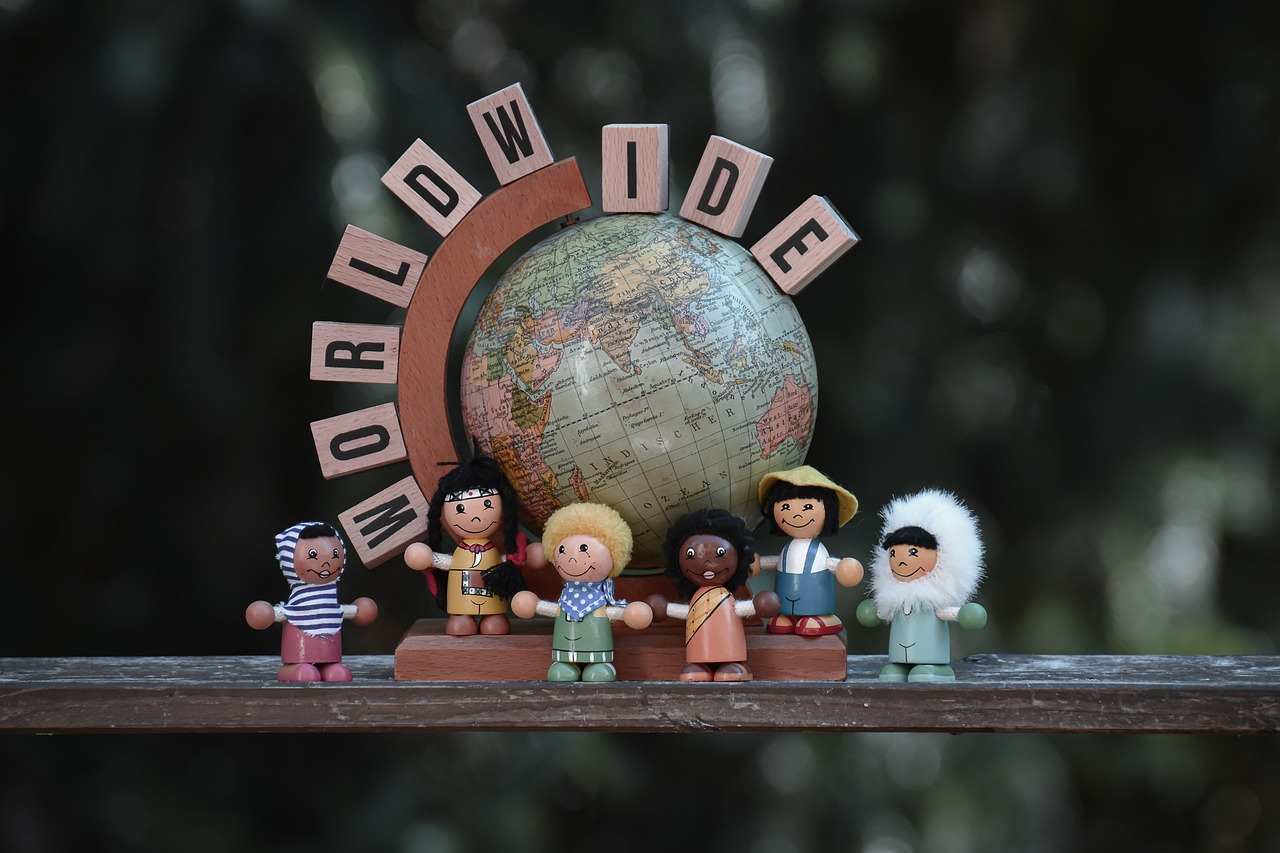
Social Cohesion vs. Diversity
When we talk about social cohesion and diversity, we’re diving into a complex dance that communities engage in every day. Imagine a vibrant tapestry, where each thread represents a different culture, belief, or background. This tapestry can be stunningly beautiful, but it can also be challenging to weave together. As immigration increases, communities often find themselves grappling with how to maintain a sense of unity while simultaneously embracing the rich variety of experiences and perspectives that newcomers bring.
On one hand, social cohesion refers to the bonds that unite people within a community. It’s about feeling connected, supported, and understood. When individuals share common values and goals, they’re more likely to work together, fostering a sense of belonging. However, this can sometimes lead to an “us versus them” mentality, where newcomers are viewed with suspicion or as threats to the established order. It raises the question: how do we create a welcoming environment without losing the essence of our original community?
On the flip side, diversity enriches our communities in countless ways. It introduces new ideas, flavors, and traditions that can breathe life into stagnant cultural practices. For example, think about how a local food festival featuring dishes from various cultures can not only tantalize taste buds but also promote understanding and respect among different groups. However, the challenge lies in ensuring that diversity doesn’t become a source of division. When people feel that their identities are under threat, it can lead to tension and conflict.
To navigate this intricate balance, communities must embrace the idea of inclusivity. This means actively engaging with diverse groups and ensuring that everyone has a voice in the conversation. One effective approach is to foster environments where cultural exchange is encouraged, allowing individuals to share their stories and traditions. This not only promotes understanding but also helps to build trust among community members. As we foster greater inclusivity, we can create spaces where both social cohesion and diversity thrive.
Ultimately, the question remains: can we find a harmonious balance between social cohesion and diversity? The answer isn’t straightforward. It requires ongoing dialogue, mutual respect, and a commitment to understanding one another. Communities that succeed in this balancing act often find that their social fabric is not only preserved but strengthened, allowing them to flourish in a world that is increasingly interconnected.
- What is social cohesion? Social cohesion refers to the bonds that unite members of a community, fostering a sense of belonging and support.
- Why is diversity important in communities? Diversity enriches communities by introducing new perspectives, ideas, and cultural practices, promoting innovation and understanding.
- How can communities promote inclusivity? Communities can promote inclusivity by engaging with diverse groups, encouraging cultural exchange, and ensuring that all voices are heard in discussions.
- What are the challenges of balancing social cohesion and diversity? The main challenges include overcoming suspicion or fear of newcomers and ensuring that diversity does not lead to division or conflict.

Policy Responses to Immigration
When it comes to immigration, the policies that governments implement can often feel like navigating a minefield. Each decision carries weighty ethical implications, and the choices made can significantly shape the lives of countless individuals. From open borders to strict regulations, the spectrum of immigration policy is vast, and each approach has its unique set of challenges and benefits. But what does it really mean to respond to immigration? Is it merely about managing numbers, or is there a deeper responsibility to consider?
One of the most debated approaches is the concept of open borders. Advocates argue that this policy could lead to a more dynamic and diverse society, allowing for a free flow of people who can contribute economically and culturally. Imagine a world where talent and innovation know no borders! However, critics raise concerns about how such a system might strain public resources and complicate national security. This duality raises a fundamental question: Can we balance the need for security with the moral obligation to welcome those in need?
On the other end of the spectrum, we have strict immigration regulations. These policies often prioritize national security and economic stability, ensuring that only those who meet certain criteria are allowed entry. While this approach can provide a sense of control and safety, it can also lead to ethical dilemmas, particularly when it comes to vulnerable populations seeking refuge. Are we, as a society, willing to turn our backs on those fleeing persecution simply because they don't fit neatly into our regulatory framework?
Another important aspect to consider is the introduction of pathways to citizenship. This policy allows immigrants to transition from temporary status to full citizenship, which can be a game-changer for many. It not only acknowledges their contributions but also integrates them into the fabric of society. However, the criteria for achieving citizenship can vary widely, leading to questions about fairness and accessibility. What does it mean to belong? And how do we ensure that the pathway is equitable for all?
To illustrate the different approaches and their implications, consider the following table:
| Policy Type | Pros | Cons |
|---|---|---|
| Open Borders | Increased diversity, economic growth | Security concerns, resource strain |
| Strict Regulations | Enhanced national security, controlled immigration | Exclusion of vulnerable populations, ethical dilemmas |
| Pathways to Citizenship | Integration, recognition of contributions | Variable criteria, potential inequities |
As we examine these policy responses, it becomes clear that the ethical implications are intertwined with the very fabric of our societies. The challenge lies in finding a balance that respects human dignity while addressing legitimate concerns about security and resource allocation. Ultimately, the question we must ask ourselves is: how do we want to define our values as a society?
- What are the main types of immigration policies?
Immigration policies can generally be categorized into open borders, strict regulations, and pathways to citizenship, each with its own set of pros and cons.
- How do immigration policies affect local communities?
Policies can lead to increased diversity and economic contributions but may also create tensions and challenges in social cohesion.
- What role do ethical considerations play in immigration policy?
Ethical considerations are crucial in shaping immigration policies, as they address the balance between national interests and humanitarian responsibilities.
Frequently Asked Questions
- What are the main ethical principles surrounding immigration?
The ethical principles surrounding immigration often revolve around balancing national interests with humanitarian responsibilities. This includes considering the rights of individuals seeking safety, the economic contributions of immigrants, and the moral obligations of countries to protect vulnerable populations. It’s a complex dance between ensuring security and upholding human dignity.
- How do human rights play a role in immigration debates?
Human rights are at the core of immigration debates, as they emphasize the moral obligations nations have towards migrants and refugees. Countries are often faced with the challenge of providing asylum and support to those fleeing persecution, while also managing their own national interests. This creates a moral imperative to protect human rights, regardless of a person's immigration status.
- What is the difference between refugees and economic migrants?
Refugees are individuals who flee their home countries due to persecution, war, or violence, seeking safety and protection. Economic migrants, on the other hand, move primarily for better economic opportunities. The ethical considerations in prioritizing one over the other in immigration policies can be contentious, as both groups have legitimate needs and rights.
- What does the right to asylum entail?
The right to asylum is a fundamental human right that allows individuals fleeing persecution to seek refuge in another country. Ethically, nations have a responsibility to protect those who are vulnerable and at risk. This right underscores the importance of creating safe havens for individuals facing dire circumstances.
- How do immigrants contribute to the economy?
Immigrants play a vital role in driving economic growth. They fill essential jobs, start businesses, and contribute to innovation. Contrary to the belief that they are a burden, many studies show that immigrants enhance productivity and bring diverse skills that benefit the economy as a whole.
- What are the ethical dilemmas of border control?
Border control raises significant ethical dilemmas as it involves weighing national security against the rights and dignity of individuals trying to cross borders. The challenge lies in ensuring safety while also respecting the humanity of those seeking a better life. Striking this balance is often a contentious issue in immigration discussions.
- How does immigration impact host communities?
Immigration can have both positive and negative effects on host communities. On one hand, it can foster diversity and cultural enrichment; on the other, it may lead to tensions and challenges in social cohesion. Understanding these dynamics is crucial for creating inclusive communities that appreciate both diversity and unity.
- What are some policy responses to immigration?
Policy responses to immigration vary widely, from open borders to strict regulations and pathways to citizenship. Each approach carries its own ethical implications, influencing how immigrants are treated and integrated into society. Policymakers must consider the broader impact of their decisions on both immigrants and the communities they join.

